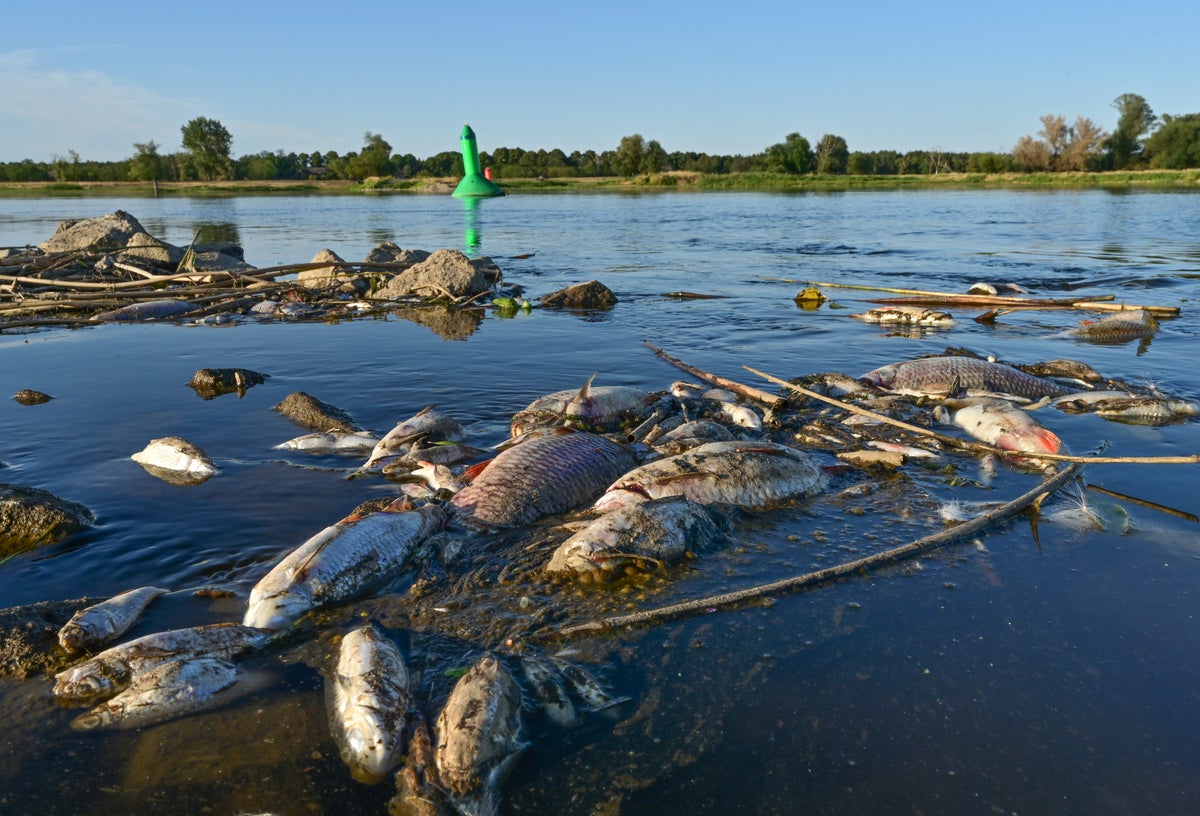
A whopping 100 tonnes of dead fish recovered from the Oder River that flows through Poland and Germany have left both countries stumped as to the origins of the mysterious mass die-off amid efforts to contain a potential ecological crisis.
Locals had spotted lifeless fish in the river as early as 28 July but the issue only caught international attention when scores of dead fish were spotted last week.
Officials initially said there were dozens of tonnes of dead fish on the Polish side of the river that originates from the Czech Republic.
On Tuesday, however, the Polish firefighters association said this figure had ballooned to at least 100 tonnes and authorities are unable to figure out the reason behind these mass deaths.
“We’d never had an operation of this scope on a river before,” Monika Nowakowska-Drynda from the national firefighter press office was quoted by local media as saying.
She confirmed around 100 tonnes of dead fish had been recovered since Friday in an operation that has had over 500 firefighters scrambling to collect the dead fish using dams, boats, quad bikes and even a drone.
People have been advised to not touch the river water over fears it could be toxic. German municipalities have also banned bathing and fishing.
Polish authorities suspect toxic chemical discharge was dumped in the river, but they have been unable to pinpoint the precise cause as poisonous chemicals like mercury have been ruled out by the country that found only elevated salt levels.
Lab samples are also being tested for high levels of chlorine along with 300 chemicals that are known to be harmful for fishes.
Polish prime minister Mateusz Morawiecki last week cited “huge amounts of chemical waste” being dumped in the river.
But on Sunday, his environment minister Anna Moskwa said after a meeting with her German counterpart Steffi Lemke: “As of today, none of these tests have confirmed the presence of toxic substances.”
“We still do not exclude a variant of the toxic substances,” she added. “We are checking entities which run business and industrial activity along the river.”
Mr Morawiecki on Monday admitted Poland was slow to react to the crisis, according to the Andalou agency, in an apparent acknowledgement of neighbour Germany’s charges of not receiving enough information on the crisis.
Ms Lemke said the failure to find the cause would result in a “massive loss of confidence” among the Polish people and between the two countries even as they created a joint task force of experts to probe possible reasons for the ecological disaster.
Poland has also offered a 1m złoty (£180,000) reward for anyone who can “help find those responsible for this environmental disaster”.
One German official said information provided so far has come “in dribs and drabs” or “not at all”.
Criticism has also poured in from environmental activists for not taking prompt action since first reports of the incident emerged in late July.
Experts have also warned the scale of the crisis could be much bigger and could wreak havoc on the entire ecosystem around the Oder River.
“We have to see how the bird population develops and what will happen to the racoons and otters,” Karina Dörk, a district administrator of Germany’s Uckermark region, told the Tagesspiegel newspaper.
“It is a catastrophe that will stay with us for years.”
Another suspected culprit behind the mass deaths can also be climate crisis-related impacts on the river such as increased warming and longer periods of drought, but this cannot be the sole cause, experts believe.
Fish in the Oder River have been struggling due to lower oxygen levels caused by historically low water levels and high water temperatures, Christian Wolter, a researcher at the department of fish biology, fisheries and aquaculture at the Leibniz Institute of Freshwater Ecology and Inland Fisheries, told DW News.
“When fish are stressed, respiration goes up,” he was quoted as saying, meaning aquatic life needs more oxygen.
The situation coupled with the continuous discharge of wastewater from industries could have resulted in a higher concentration of salt and organic material, he further explained in the report.
While authorities believe the trigger for such a mass-scale crisis could be different, this incident has once again brought attention to the urgent need to protect crucial ecosystems from toxic chemicals.
While the Oder is known to be a relatively clean river, it also plays an extremely important role in providing an ecological corridor for species migration in central Europe, connecting eventually to the Baltic sea, which if disturbed can have lasting consequences for the entire ecosystem.







